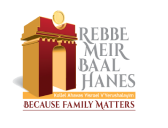יְהִי רָצוֹן מִלְּפָנֶיךָ יְהוָֹה אֱלֹהֵינוּ וֵאלֹהֵי אֲבוֹתֵינוּ, שֶׁיִּהְיוּ מְזוֹנוֹתַי וּפַרְנָסָתִי וּמְזוֹנוֹת וּפַרְנָסַת בְּנֵי בֵּיתִי עִם מְזוֹנוֹת וּפַרְנָסַת כָּל עַמְּךָ בֵּית יִשְׂרָאֵל, מֻכְתָּרִים וּמְאֻמָּתִים וּמֻצְדָּקִים בְּיָדְךָ, וְאַל תַּצְרִיכֵנִי לִידֵי מַתְּנַת בָּשָּׁר וָדָם וְלֹא לִידֵי הַלְוָאָתָם, כִּי אִם לְיָדְךָ הַמְּלֵאָה הַפְּתוּחָה, הַקְּדוֹשָׁה וְהָרְחָבָה
אֶלָקָא דְמֵאִיר עַנַנֵי אֶלָקָא דְמֵאִיר עַנַנֵי, אֶלָקָא דְמֵאִיר עַנַנֵי
Amar Rabbi Binyamin, hakol bechezkat soomin ad sheHakadosh Baruch Hu meir et eineihem, min hacha: vayifkach Elohim et eineyhah vtelech vatimaleh et hachemet.
Eloha d’Meir eineini, Eloha d’Meir eineini, Eloha d’Meir eineini, b’zechut hatzadakah sheani nodev l’ilui nishmat Rabbi Meir Ba’al HaNess zechto yagen aleinu, limztoh et ha’aveida she’ebaditi.
Rabbi Binyamin said: All are presumed blind until the Holy One, blessed be He, enlightens their eyes. We know this from the verse: “G-d opened her eyes and she went and filled up the water skin.
God of Meir, answer me. God of Meir, answer me. God of Meir, answer me. In the merit of the charity which I am donating for the sake of the soul of Rabbi Meir the Miracle Worker may I find the object which I have lost.

Rabbi Meir Baal Haness


 maaser you should be giving every month, which is 10% of your net income after taxes and expenses,
maaser you should be giving every month, which is 10% of your net income after taxes and expenses,  Pointers and Perspective on Parnassah
Pointers and Perspective on Parnassah  Balancing Hishtadlus for
Parnassah
Balancing Hishtadlus for
Parnassah  Parnassah Problems:
How Jewish Finances Can Work
Parnassah Problems:
How Jewish Finances Can Work 
 We can light a candle on your behalf at Rebbe Meir's Holy Tomb.
We can light a candle on your behalf at Rebbe Meir's Holy Tomb. 